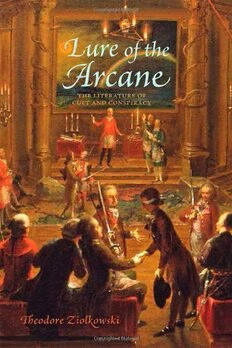
Lure of the Arcane: The Literature of Cult and Conspiracy PDF
Preview Lure of the Arcane: The Literature of Cult and Conspiracy
Lure of the Arcane This page intentionally left blank Lure of the Arcane The Literature of Cult and Conspiracy Theodore Ziolkowski The Johns Hopkins University Press Baltimore © 2013 The Johns Hopkins University Press All rights reserved. Published 2013 Printed in the United States of America on acid- free paper 9 8 7 6 5 4 3 2 1 The Johns Hopkins University Press 2715 North Charles Street Baltimore, Mary land 21218- 4363 www .press .jhu .edu Library of Congress Cataloging- in- Publication Data Ziolkowski, Theodore. Lure of the arcane : the literature of cult and conspiracy / Theodore Ziolkowski. pages cm Includes bibliographical references and index. ISBN- 13: 978- 1- 4214- 0958- 0 (hardcover : acid- free paper) ISBN- 13: 978- 1- 4214- 0959- 7 (electronic) ISBN- 10: 1- 4214- 0958- 5 (hardcover : acid- free paper) ISBN- 10: 1- 4214- 0959- 3 (electronic) 1. Conspiracy in literature. 2. Secret societies in literature. 3. Secrecy in literature. I. Title. PN56.C675Z56 2013 809'.93355— dc23 2012041101 A cata log record for this book is available from the British Library. Special discounts are available for bulk purchases of this book. For more information, please contact Special Sales at 410- 516- 6936 or [email protected]. The Johns Hopkins University Press uses environmentally friendly book materials, including recycled text paper that is composed of at least 30 percent post- consumer waste, whenever possible. For my wife Yetta Goldstein Ziolkowski to whom I have been bound for over sixty years with cultlike devotion and in conspiratorial mystery This page intentionally left blank Contents Preface ix Introduction 1 1 The Mystery Cults of Antiquity 11 2 The Order of Knights Templar in the Middle Ages 29 3 The Rosicrucians of the Post- Reformation 46 4 The Lodges of the Enlightenment 65 5 Secret Societies of Romantic Socialism 99 6 Modern Variations 132 7 Interlude: The Protocols of the Elders of Zion 159 8 The Playfulness of Postmodernism 178 Conclusion 195 Notes 201 Index 225 This page intentionally left blank Preface This book can be seen in part, I suppose, as an attempt to rationalize and justify my longtime practice at bedtime of reading mysteries or thrillers— books that some of my academic colleagues have uncharitably called “trash” but that I pre- fer to regard more tolerantly, along with such fans as W. H. Auden, T. S. Eliot, Jorge Luis Borges, Friedrich Dürrenmatt, and Umberto Eco as literary sociology, fi ctionalized politics, or aestheticized current events. Whether we share the cyn- ical view or the loft ier one, it has long been clear to me that readers and audiences for many centuries have been subject to the same proclivity for mystery, a sus- ceptibility that accounts for the continuing popularity of many literary works that we now regard as classics, from Euripides’ Bacchae to the present. At the same time, the morning newspapers seemed to dwell increasingly dur- ing the fi rst dec ade of the twenty- fi rst century on stories about conspiracies: from plots by Al- Qaeda or the CIA to destroy buildings and airplanes to the controversies surrounding the cults of Scientology or Opus Dei, from the schemes of left - wing radicals to the counterplots of conservative extremists to undermine the government. These conspiracies in turn and in an unending cycle inform the conspiracy fi ction and fi lms that entertain many devotees. My vague ruminations were catalyzed when my wife, Yetta, who has long pro- vided the liveliest stimulation to my imagination, urged me to read George Sand’s The Countess of Rudolstadt just at the moment when I was enjoying one of my
